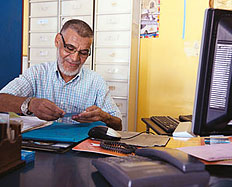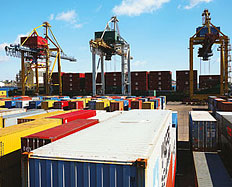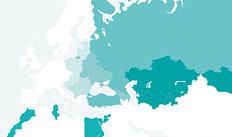Country Assessments
Albania
HIGHLIGHTS OF THE PAST YEAR
- Growth was robust last year but is declining in 2012, mainly as a result of the eurozone crisis. Economic growth exceeded 3 per cent once again in 2011, despite significant external pressures. However, various indicators in 2012 suggest a sharp slow-down in economic activity, and vulnerability to spillovers from the eurozone crisis is likely to remain present for some time.
- Important steps have been taken to protect the banking sector. These include measures to allow foreign bank branches to be converted into subsidiaries and new legislation to allow for the establishment of a bridge bank. So far, the banking sector has coped well with the pressures from the eurozone crisis.
- Plans to increase hydropower capacity through private sector involvement are advancing. The authorities have put a number of generation companies up for sale and have issued public-private partnership (PPP) tenders for new facilities.
KEY PRIORITIES FOR 2013
- Further reforms are needed to advance in the EU approximation process. Strengthening democracy and the rule of law are key to achieving this objective.
- Albania should make further moves towards a sustainable energy sector. The country has the potential to become a regional player in the renewable energy market, but this will require improved efficiency and viability of distribution and generation, a substantial increase in private sector participation in power generation, and an improved regulatory framework.
- Continued vigilance is needed to address any fallout from the crisis in the eurozone periphery. Albania is highly vulnerable to further escalation of the crisis due to its close trade, investment and remittance ties with the countries in the eurozone, particularly Greece and Italy.
MACROECONOMIC PERFORMANCE
The economy contracted in the first quarter of 2012. Albania was the only country in south-eastern Europe that continued to grow during the 2009 global financial crisis and beyond, with robust growth rates of over 3 per cent in 2010 and 2011. Some signs of growth deceleration emerged in the second half of 2011 in light of a weakening performance in some key EU markets, such as Greece and Italy, but it was only this year that the first contraction in output was reported in Albania. According to national statistics, GDP fell by 1.2 per cent in the first quarter of 2012 relative to the previous quarter. The unfavourable external environment is expected to persist this year, and various high-frequency macroeconomic indicators such as industrial production and retail turnover point to continued weak economic activity in the second quarter.
The inflation rate has remained moderate. In January 2012 inflation fell below the target range of 2-4 per cent. With concerns mounting over the weakening economic growth, the central bank began a series of cuts in the base interest rate this year, with the latest – in July 2012 – bringing down the interest rate to a historic low of 4 per cent. The government is targeting a deficit of 3 per cent of GDP in 2012, an ambitious target that will be difficult to achieve in light of the weaker than expected economic performance so far this year. Public debt is only just below the 60 per cent of GDP limit enshrined in the budget law.
Only limited growth is expected in 2012 and 2013. Under baseline expectations of slow and uneven progress in containment of the eurozone crisis, the external environment will remain unfavourable to a recovery in economic activity following the first quarter decline. Domestic demand is also expected to remain weak, especially in light of weakening credit growth and the observed decline in remittances, which are a vital source of income for many Albanians. As a result, GDP growth in 2012 and 2013 is likely to be below the levels seen in recent years, and vulnerabilities will remain high as long as neighbouring eurozone countries stay in difficulties.
MAJOR STRUCTURAL REFORM DEVELOPMENTS
The European Commission (EC) has recommended that Albania be granted EU candidate status, subject to the completion of certain key reforms, including in the judiciary and public administration. This was the main conclusion of the EC's latest Progress Report, published in October 2012, on Albania's track record in reforms. In its report, the EC welcomed the political dialogue in the country. The European Council will make a decision on this recommendation in December 2012.
Privatisation is well advanced, but some significant assets remain to be sold. Parliament approved the sale of state-owned oil producer Albpetrol in December 2011, and the government has confirmed its intention to proceed with the sale of its 100 per cent stake in the enterprise. An attempt to sell the company in 2010 failed. The government has also said it will offer a 15 per cent stake in Albania’s only oil refinery ARMO as well as its remaining 16.8 per cent stake in Albtelecom, which dominates the domestic landline market.
Tariffs in the energy sector remain significantly below costs. Pricing issues have been at the core of a dispute between the private distribution company, CEZ, and the state-owned enterprise KESH, which controls nearly all production and transmission in the country. CEZ suffered significant financial losses over the past year because the energy regulator raised the prices at which electricity was sold by the generation company but maintained the final consumer tariffs, thus significantly squeezing CEZ’s margins. CEZ was also unable to meet regulatory targets for reducing technical and non-technical losses. However, progress has been made in 2012 in resolving disputes among CEZ, KESH and budget entities, and CEZ has agreed to settle for a payment of approximately €40 million.
Limited progress has been made in improving the security of energy supply. The 400 kV interconnection line between Albania and Montenegro, which became operational in April 2011, has improved access to electricity imports. However, domestic electricity production remains vulnerable due to the near exclusive reliance on hydropower. In June 2012 the government announced a tender for the concession of the Fier thermal power plant. The plant has not been operational since April 2007 and requires significant rehabilitation before it can resume production.
The government is seeking to further increase its hydropower production capacity. In January 2012 it launched a tender for three hydropower BOT concessions for Vokopola 1, 2 and Gavran. Successful PPPs would enable an increase in private sector participation in the power generation sector, which remains largely controlled by the state-owned company, KESH. Privatisation of hydropower facilities is also under way; the government has sold four hydropower plants – Bistrica 1 and 2, Ulza and Skopeti – in June this year.
The government has continued to support improvements in the transport infrastructure. Construction is ongoing on two sections of the Tirana-Elbasan motorway. The entire road is expected to be completed by the end of 2012 and the Albanian authorities intend to introduce a toll system after its completion. The government announced a new concession for a motorway linking the port town of Durres with the country’s Kosovo border. In August 2012 a new concession was also announced for the maintenance and operation of the eastern terminal of the port of Durres. The government has stated its intention to grant concessions for Albanian railways.
The government has taken important action to reduce risks in the financial sector. These moves are in response to growing concerns over the potential impact of the eurozone crisis on the Albanian banking system. Under the new regulation, which was approved by parliament in November 2011, the central bank can require that Albanian branches of foreign banks be converted into subsidiaries, subjecting them to local supervision. This will strengthen the local regulatory oversight with a view to limiting the risks of sudden liquidity outflows. In a related development, in June 2012 the Bank of Albania approved the establishment of a bridge bank, which would support domestic banks affected by the crisis. If the bank is a foreign subsidiary, the bridge bank will cover the costs of its transformation to a subsidiary. The measures were taken in light of the fact that over 90 per cent of banking assets in the country are controlled by foreign banks, of which about 30 per cent are Greek and Italian banks.







